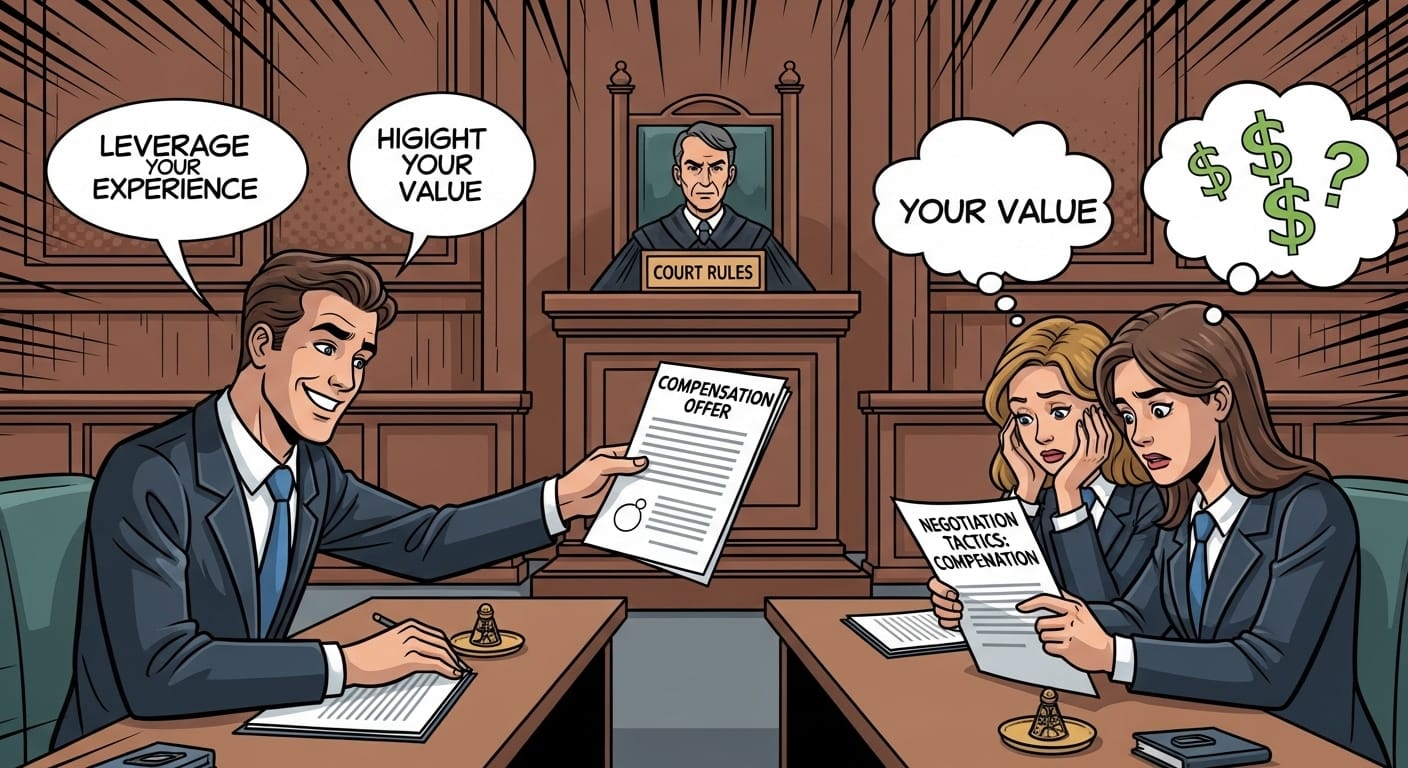Negotiating for higher compensation in court can feel a lot like trying to convince your cat to take a bath—both are fraught with challenges, and you might end up wet and frustrated.
However, with the right tactics, you can navigate the legal waters and come out on top (hopefully without needing a towel).
So, whether you’re dealing with insurance adjusters or opposing counsel, let’s dive into some effective negotiation strategies that could lead to that sweet payout you’re after.

Top Takeaways and Key Concepts
Know Your Case Value: Research and itemize all losses to determine realistic and strong compensation demands.
Build Strong Evidence: Collect medical records, photos, and witness statements to support your negotiation position.
Understand Your Opponent: Learn their tactics, motivations, and tendencies to tailor your negotiation strategy effectively.
Time Negotiations Strategically: Use new information or evidence to revisit offers and increase leverage.
Stay Calm and Know When to Walk Away: Maintain composure, listen actively, and be prepared to reject unfair offers.
Summary of This Article
Please Note: This post may contain affiliate links. If you click one of them, we may receive a commission at no extra cost to you. As an Amazon Associate, I earn from qualifying purchases.
The article provides strategies for negotiating higher compensation in legal or insurance contexts. Key steps include knowing the value of your claim, gathering strong evidence, understanding the opposing party’s behavior, and timing negotiations effectively. Active listening and maintaining composure during discussions enhance credibility and clarity, while being willing to walk away ensures you do not accept unfavorable settlements. By combining preparation, strategy, and patience, individuals can maximize compensation while navigating the negotiation process confidently.
Understand Your Worth

First things first: know what your case is worth. This isn’t just about throwing darts at a board of numbers and hoping one sticks; it requires thorough research.
By the way, consider compiling all your expenses related to the incident—medical bills, lost wages, even those overpriced lattes you bought while drowning your sorrows. When you have this data ready, it becomes easier to present a solid case.
Interestingly enough, many people undervalue their claims simply because they don’t realize how much they’ve actually spent or lost due to someone else’s negligence.
Take the time to itemize everything. You’d be surprised how quickly those costs add up! And remember: if you think your claim is worth $10,000, aim higher during negotiations. After all, who doesn’t love negotiating down from an inflated number?
Build Your Case with Evidence
Next up is evidence—the bread and butter of any good negotiation (or maybe more like the peanut butter and jelly). Without solid proof backing up your claims, you’re basically asking someone to believe in unicorns.
Gather medical records, photographs of injuries or damages, witness statements—you name it! The more evidence you have supporting your position, the stronger your argument will be.
Honestly, showing up with a well-documented case makes it hard for anyone on the other side to dismiss what you’re saying.
Think of it as bringing a cake to a potluck: everyone wants a slice when it looks delicious! If your evidence is compelling enough—like photos showing just how bad that slip-and-fall really was—you’ll put yourself in a better position during negotiations.
Know Your Opponent
Understanding who you’re negotiating against can be as important as knowing what you’re fighting for. Are they tough negotiators? Do they tend to cave under pressure?
Knowing this can help shape your approach. For instance, if you’re facing an insurance company known for lowball offers (they exist!), prepare yourself for some serious back-and-forth.
Speaking of which—don’t forget about their motivations! Insurance companies want to settle cases quickly and cheaply; however, if they see that you’re informed and prepared with documentation and clear demands based on calculated losses—they may reconsider their initial offer.
Timing Is Everything
Timing can make or break any negotiation process—and I’m not just talking about when it’s appropriate to tell dad jokes during serious discussions (hint: never). You need to know when it’s best to push forward or hold back in negotiations based on developments in the case or new information coming into play.
For example, if new evidence surfaces after an initial settlement offer has been made—something like an eyewitness account that backs up your claims—it might be time for another round of discussions about compensation amounts!
Always keep communication lines open so both sides understand each other’s timelines; this helps build trust while also putting pressure where needed.
Practice Active Listening
One tactic often overlooked is active listening—a skill that seems simple but works wonders in negotiations. Instead of just waiting for your turn to speak (we’ve all done this), try genuinely hearing what the other party has to say. What concerns do they express? What points resonate with them?
By understanding their perspective better through active listening techniques—you know nodding thoughtfully instead of zoning out—you’ll uncover areas where compromise could occur while still maximizing potential compensation amounts overall!
Stay Calm Under Pressure
Let’s face it: courtrooms can be intimidating places filled with lawyers wearing suits sharper than knives (and sometimes equally dangerous!). It’s easy for emotions—fear included—to run high during negotiations. However emotional breakdowns rarely lead anywhere good unless we’re talking about soap operas!
So here’s my advice: maintain composure throughout discussions no matter how heated things get around you—even if opposing counsel tries pulling every trick in the book!
Staying calm allows clarity when making decisions rather than acting impulsively out frustration which could cost valuable ground gained earlier on!
Be Willing To Walk Away
Finally—and perhaps most importantly—be prepared for the possibility of walking away from negotiations if necessary! Sometimes parties simply cannot meet halfway despite efforts made by both sides involved; knowing when enough is enough empowers individuals seeking justice without settling too easily on unfavorable terms!
Think of yourself as having options akin choosing between pizza toppings: why settle only pepperoni when there are plenty more flavors available?! If push comes to shove over unfair offers presented before trial begins—it may serve better pursuing litigation instead rather than accepting something less than deserved compensation altogether!
Suggested Resources:
Understanding Damages – Types and How They Are Calculated
https://www.nolo.com/legal-encyclopedia/understanding-damages-types-how-they-calculated.html
Negotiation Skills Training
https://www.mindtools.com/pages/article/newTMC_81.htm
The Art of Negotiating
https://hbr.org/2016/07/the-art-of-negotiation
Frequently Asked Questions
How can I determine the value of my case before negotiations?
Start by calculating all expenses related to your claim—medical bills, lost wages, and other losses. Research similar cases to estimate a realistic compensation amount.
Why is evidence important in negotiation for compensation?
Strong evidence such as photos, medical reports, and witness statements supports your claims and makes it harder for the opposing side to dispute your demand.
How does understanding the opposing party help in negotiations?
Knowing your opponent’s tactics and motivations helps tailor your approach, anticipate counteroffers, and increase leverage during compensation discussions.
When is the best time to renegotiate or increase an offer?
Introduce new evidence or information, such as additional witness statements or medical updates, to revisit prior offers and strengthen your negotiating position.
What role does active listening play in negotiation?
Active listening helps you understand the other side’s concerns and identify areas for compromise, improving communication and overall negotiation outcomes.
How can I stay calm during stressful court negotiations?
Focus on facts, breathe deeply, and remain professional. Keeping composure prevents emotional reactions that can weaken your negotiating position.
When should I walk away from a negotiation?
If offers are unfair or far below your claim’s value, walking away can demonstrate confidence and may lead to better outcomes through continued negotiation or trial.

Kevin Collier is a legal expert passionate about simplifying complex legal concepts for everyday individuals. With a focus on providing clear, practical information, he covers a wide range of topics, including rights, responsibilities, and legal procedures. Kevin aims to empower readers with the knowledge they need to navigate the legal landscape confidently, ensuring they can make informed decisions regarding their legal matters. Through insightful articles and easy-to-understand resources, he helps demystify the law, making it accessible to all.










